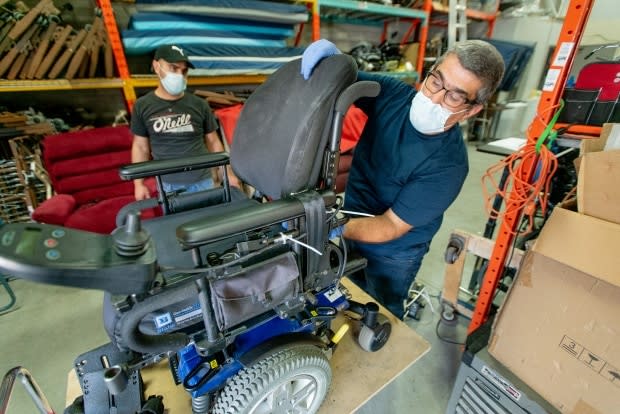Health charities in Canada hit with historic loss in revenue during COVID-19
Canada's health charities expect to raise less than half of their normal funds this year because of COVID-19.
The pandemic has led to the cancellation of many in-person events that charities rely on for fundraising, and the financial hit means delays in disease research and fewer supports for people with a variety of illnesses.
The Health Charities Coalition of Canada is an umbrella group of national health charities that typically host walkathons, galas and other major fundraising events which raise around $650 million a year. Its members report that revenues have fallen more than 50 per cent as physical distancing requirements during the COVID-19 crisis curtailed those events.
Tammy Moore chairs the board of directors of Health Charities Coalition of Canada and is CEO of ALS Canada, where she says the decline in donations has delayed getting mobility chairs, hospital beds and ceiling lifts to help people with ALS, who can experience progressive paralysis over the span of two to five years before death.
"This has been so critical because caregivers are seeing an increased burden as the personal support workers are not able to go in the home in the same way," Moore said. "Making sure that people physically can stay safely in their homes is an important part of the equipment provision that we have."

Moore said they're having a hard time picking up and delivering donated devices in the midst of the pandemic, with fewer volunteers. The group turns to Rehab Medical Mobility Equipment to repair the devices, a service that's become more critical now.
The Canadian Cancer Society expects a drop of between $80 and $100 million in donations this year. It's been forced to cancel hundreds of events such as its Relay for Life, which was "reimagined" as a virtual version that raised around $4.2 million, compared to more than $20 million in each of the last two years. The organization also anticipates its virtual Run for the Cure in October will raise less money than it has previously.
Grassroot efforts stifled
Andrea Seale, CEO of the Canadian Cancer Society, said the group delivers support to people going through cancer and to their caregivers, runs summer camps for children living with cancer, and advocates on health policies. All of those areas have been hit by what Seale said is likely the greatest financial challenge in the organization's 80-plus-year history.
"We're supported by a tremendous amount of grassroots effort from volunteers in the community," Seale said from Vancouver. "Some of that effort can go online, but certainly not all of it. "
About 60 per cent of net proceeds go to client services in the province in which the funds were raised, and the rest supports research, which Seale said has been deferred and slowed during the pandemic.
Seale hopes that determination and creativity in finding online ways for people to support the charity will help it get through the pandemic. But, she said, it is hard to predict how long it will take for services to return fully.
Smaller charities hard-hit
Smaller charitable organizations like the Sickle Cell Association of Ontario have also faced a tough year. The group receives no government funding and serves more than 500 people with the inherited disorder that hampers how vital red blood cells function.
The group said it receives around $2,000 a month in donations on average. That's dropped to $400 a month since March.

Alvin Merchant, a board member in Toronto who lives with the disease, said being immune-compromised puts people in a "serious quandary" during COVID-19.
Support groups for adults used to gather in person for yoga warm-ups, physical activity, massage services donated by a local college and child-minding.
"People in the sickle cell community already feel isolated; they're dealing with a disease that no one understands," Merchant said.
Merchant said his group hopes to tap into the federal government's $350-million Emergency Community Fund for community organizations serving vulnerable people during COVID-19. But, he said, the organization will have to find unique ways to raise awareness.


